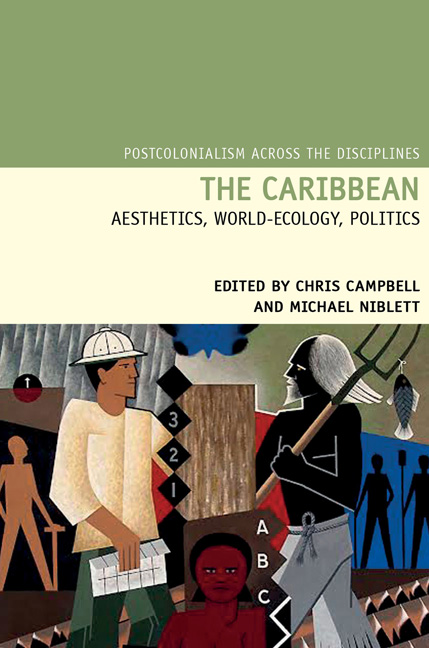Book contents
- Frontmatter
- Contents
- Acknowledgements
- Introduction: Critical Environments: World-Ecology, World Literature, and the Caribbean
- Prologue: The Brutalization of Truth
- Catastrophes and Commodity Frontiers
- 1 The Political Ecology of Storms in Caribbean Literature
- 2 Zombies, Gender, and World-Ecology: Gothic Narrative in the Work of Ana Lydia Vega and Mayra Montero
- 3 Gade nan mizè-a m tonbe: Vodou, the 2010 Earthquake, and Haiti's Environmental Catastrophe
- Ecological Revolutions and the Nature of Knowledge
- Economies of Extraction: Restructuring and Resistance
- Epilogue: Tingaling
- Notes on Contributors
- Index
3 - Gade nan mizè-a m tonbe: Vodou, the 2010 Earthquake, and Haiti's Environmental Catastrophe
from Catastrophes and Commodity Frontiers
- Frontmatter
- Contents
- Acknowledgements
- Introduction: Critical Environments: World-Ecology, World Literature, and the Caribbean
- Prologue: The Brutalization of Truth
- Catastrophes and Commodity Frontiers
- 1 The Political Ecology of Storms in Caribbean Literature
- 2 Zombies, Gender, and World-Ecology: Gothic Narrative in the Work of Ana Lydia Vega and Mayra Montero
- 3 Gade nan mizè-a m tonbe: Vodou, the 2010 Earthquake, and Haiti's Environmental Catastrophe
- Ecological Revolutions and the Nature of Knowledge
- Economies of Extraction: Restructuring and Resistance
- Epilogue: Tingaling
- Notes on Contributors
- Index
Summary
In overthrowing me, you have cut down in Saint-Domingue only the tree of liberty. It will spring up again by the roots for they are numerous and deep. – Toussaint L'Overture, 1803
I say your mother has called upon Bwa Nan Bwa
Don't you see the misery I'm going through?
Oh, my mother has called upon Bosou Bwa Nan Bwa
Don't you see the misery I'm going through?
Resign yourself Oh Resign yourself, Adyw!
Don't you see the misery I've fallen into?
– Vodou song to Bwa Nan BwaIn Alan Lomax's compilation of Haitian music – Alan Lomax in Haiti, released in 2009 by the Smithsonian Institution – there is a song performed by Francilia, a Rèn Chante or song leader in Vodou, dedicated to the lwa or spirit Bwa Nan Bwa (Tree in the Woods), asking him to look upon the misery his people are mired in. Francilia's plaintive Vodou song, with its poignant faith in the powers of the lwa to bring succour to their devotees in their wretchedness, reminds us that Haiti's faith in Vodou – already tested by the nation's severe environmental predicament – entered a period of crisis in the wake of the January 2010 earthquake and its aftermath of death, crippling injuries, and epidemic. Her song sadly underscores the reality that Haiti's severe deforestation, the loss of 98 per cent of its trees – of the musician trees and sacred mapous that filled its once abundant forests and formed the natural habitat for Bwa Nan Bwa – had been the most tragic expression of the economic, social, and religious quandary the nation of Haiti had faced before the January 2010 earthquake.
In the discussion that follows, I trace a somewhat circuitous route – from Haiti's environmental predicament (the fate of its trees), through the ongoing cholera outbreak and the crisis of faith unleashed by the January 2010 earthquake, and back to the trust in the lwa conveyed by Francilia and her song to Bwa Nan Bwa – seeking to bring to the fore the connections between Haiti's environmental crisis, its contribution to the deepening of the impact of the 2010 earthquake, and the nation's foundational religious faith.
- Type
- Chapter
- Information
- The CaribbeanAesthetics, World-Ecology, Politics, pp. 63 - 78Publisher: Liverpool University PressPrint publication year: 2016



